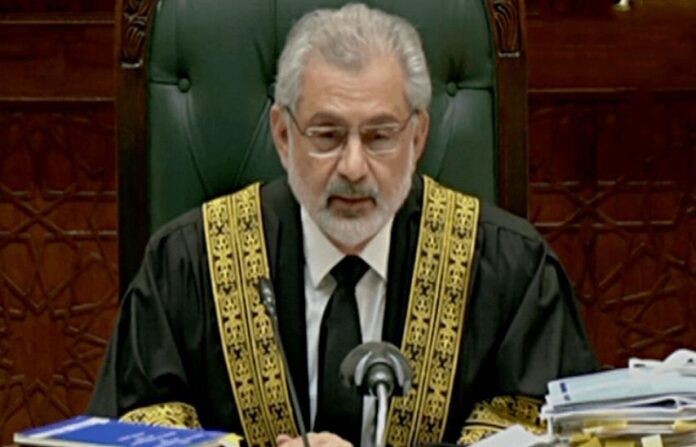ISLAMABAD: Chief Justice of Pakistan (CJP) Qazi Faez Isa has observed that the entire Pakistan is happy over the amended Election Act 2017 that limited lawmakers’ disqualification period to five years.
“No one has challenged five-year disqualification law,” the CJP remarked on Friday during a hearing of a case related to the disqualification of lawmakers under Article 62(1)(F) of the Constitution.
A seven-member larger bench — headed by CJP Isa and comprising Justice Syed Mansoor Ali Shah, Justice Yahya Afridi, Justice Aminuddin Khan, Justice Jamal Khan Mandokhel, Justice Muhammad Ali Mazhar, and Justice Musarrat Hilali — conducted the hearing.
The apex court had taken notice of contradictions regarding the duration of disqualification in the Election Act, 2017, and an apex court verdict during a past hearing on a petition filed by former PML-N provincial lawmaker Sardar Meer Badshah Khan Qaisrani last month.
Qaisrani had challenged his lifetime disqualification over a fake degree in 2007.
Proceedings were being broadcast live on SC’s website and YouTube channel. The court has taken a break till Friday prayers.
In the previous hearing on Thursday, CJP Isa remarked that disqualifying anyone for life from parliament was “against Islam”, adding that the court was seeking “clarity” on whether the disqualification period for a lawmaker was five years — as per the amendment in Election Act 2017 — or a lifetime ban under the aforementioned article which deals with the criteria to contest elections.
CJP Isa said that the solution to this matter is present in Islam.
“The Holy Quran mentions that the status of humans is very high,” the top judge said, referring to a verse from Surah Sajdah which explains that human beings are not bad but their deeds are.
“Disqualifying anyone [for life] is against Islam,” he added.
Today’s hearing
As the proceedings commenced today, CJP Isa said that the top court would not take up individual cases related to elections but would only hear matters related to constitutional interpretation.
Following this, Jahangir Tareen’s lawyer, Advocate Makhdoom Ali Khan, started his arguments.
Justice Shah questioned Khan if according to him, the declaration of disqualification would come from the civil court. To this, Advocate Khan replied in the positive.
Justice Mazhar then asked whether Article 62(1)(f) can be implemented before the elections or even after the polls.
At this, Khan replied, “The candidate is disqualified pre-elections if we read Articles 62 and 62 together”.
After this, the CJP asked, “Why are we limiting ourselves to only one specific part of the Constitution and disregarding the constitutional history and fundamental rights?”
“Do not limit yourself and as a constitutional expert, explain to us in a broader context,” the CJP told the lawyer.
Tareen’s counsel Khan implored the larger bench to overturn the Samiullah Baloch case verdict wherein the top court held that the disqualification period under Article 62(1)(F) will be for life.
The case
The fate of many politicians, including Pakistan Muslim League-Nawaz (PML-N) supremo Nawaz Sharif and Istehkam-e-Pakistan Party (IPP) founder Jahangir Tareen, depends on the verdict of this case.
Whether the aforementioned politicians can contest the upcoming polls or not will be determined by the outcome of the case.
The SC conducted the last hearing of this case on January 2, during which CJP Isa advised against assuming that a particular party was being favoured.
Earlier, during a hearing on December 11 last year, CJP Faez Isa observed that the Supreme Court’s judgment on lifetime disqualification and the amendments made to the Elections Act 2017 could not exist simultaneously.
He had said either the legislation enacted by the parliament to the Elections Act 2017 would prevail or the judgment, delivered by the Supreme Court.
“The issue has to be settled once and for all,” the CJP had remarked and referred the matter to a three-member committee, constituted under Section 2 of the Supreme Court (Practice and Procedure) Act, 2023 that decides fixation of cases before benches of the apex court.
The Supreme Court, in a judgment in 2018, had held that any person disqualified under Article 62(1)(f) of the Constitution would be considered disqualified for lifetime.
Later on, the former coalition government of Pakistan Democratic Movement (PDM) made an amendment to the Elections Act 2017, decreasing the legislators’ disqualification to five years, retrospectively.

















